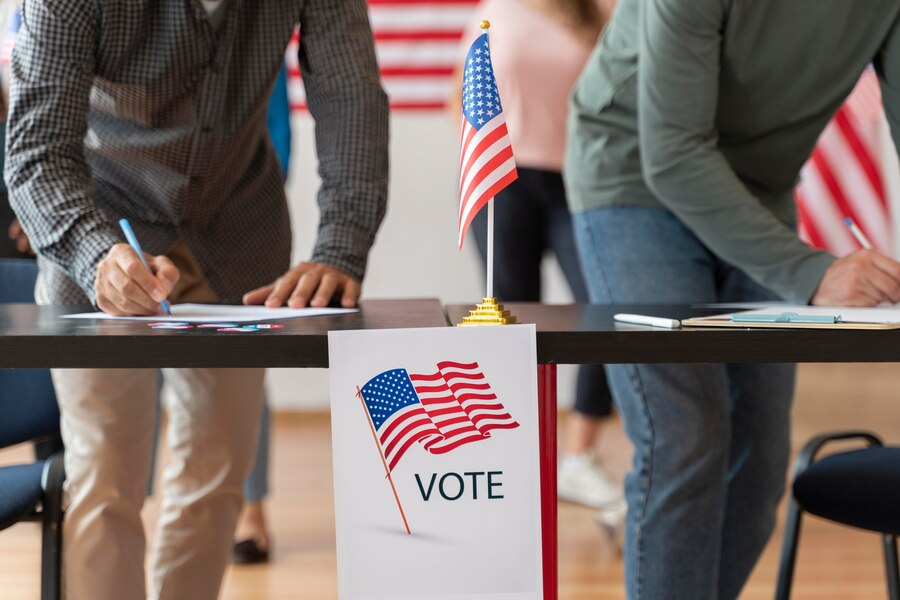In the United States, voting rights are a pivotal element of democracy, often stirring debates and discussions about who should have the privilege to vote. This article delves into a specific aspect of this broad topic: whether green card holders have the right to participate in local elections, particularly focusing on states like Texas. We will explore the 3 requirements to vote in the United States, as well as examine the conditions under which green card holders might be allowed to vote locally.
Voting Rights in the United States: An Overview
Voting in the United States is a fundamental right reserved primarily for U.S. citizens, encompassing participation in federal, state, and most local elections. However, the landscape of local voting rights for non-citizens introduces complexity and variation across jurisdictions. To participate in elections, individuals must meet specific criteria, which can vary slightly depending on the level of government and locality.
Requirements for Voting in the United States
To exercise their right to vote, individuals must meet three primary requirements:
- Citizenship: The voter must be a U.S. citizen, acquired either by birth or through the process of naturalization. Citizenship serves as a foundational qualification, ensuring that those who participate in elections have a direct stake in the governance and direction of the country.
- Age: Eligible voters must be at least 18 years old on or before Election Day. This age requirement aims to ensure that individuals have reached a level of maturity and understanding necessary to make informed decisions about the candidates and issues presented on the ballot.
- Residency: Voters must establish residency in the state where they intend to cast their vote. Residency requirements vary by state but generally entail living in the state for a specific period, typically ranging from several weeks to several months before Election Day. Residency serves as a means of ensuring that voters have a tangible connection to the communities and issues they are voting on.
It’s important to note that while these requirements serve as broad eligibility criteria, variations and exceptions exist, particularly at the local level. Local governments may enact ordinances or policies that extend voting rights to certain non-citizen residents for specific local elections or issues.
Local Voting Rights for Non-Citizens
The issue of local voting rights for non-citizens introduces a layer of complexity to the electoral landscape in the United States. While citizenship is a standard requirement for participation in federal and most state elections, some local jurisdictions have implemented measures to allow non-citizen residents to vote in certain municipal or school board elections. Important considerations regarding voting rights for non-citizens at the local level comprise:
- Jurisdictional Variations: The decision to grant voting rights to non-citizens in local elections is determined by individual municipalities or counties. As a result, there is significant variation in policies across the country. Some jurisdictions extend voting rights to non-citizens for all local elections, while others restrict participation to specific issues or offices.
- Community Representation: Advocates for non-citizen voting rights argue that allowing residents who are not U.S. citizens to participate in local elections promotes inclusivity and ensures that all members of the community have a voice in local decision-making processes. This approach is particularly relevant in areas with large immigrant populations, where non-citizen residents contribute to the local economy and community but are disenfranchised from the political process.
- Opposing Perspectives: Critics of non-citizen voting rights raise concerns about the integrity of the electoral process and the dilution of citizenship privileges. They argue that voting is a fundamental aspect of citizenship and should be reserved exclusively for those who have completed the naturalization process. Additionally, opponents may express concerns about the potential for non-citizen voting to influence the outcome of elections in ways that do not align with the interests of U.S. citizens.
Can Green Card Holders Vote Locally in the U.S.?
The question of whether green card holders can vote locally in the U.S. hinges on various factors, primarily determined by the state and the specific election in question. Green card holders, formally referred to as lawful permanent residents, do not possess U.S. citizenship, which renders them ineligible to participate in federal elections. However, the eligibility of green card holders to vote in local elections varies across jurisdictions.
Specifics for Texas
In the state of Texas, the regulations regarding voting eligibility are unequivocal: participation in local, state, or federal elections necessitates U.S. citizenship. Therefore, the question arises: can green card holders vote locally in Texas? The answer is no. Texas state law expressly mandates that only individuals who hold U.S. citizenship are permitted to exercise their voting rights, aligning with the overarching requirements for voting in the United States.
Comparison with General Requirements
Texas’s stance on voting rights for green card holders aligns with the general requirements for voting in the United States, which encompass citizenship, age, and residency. While lawful permanent residents may meet the age and residency criteria, their lack of U.S. citizenship precludes them from participating in elections, regardless of the level of government. Here are the significant points relevant to Texas:
- Clear Citizenship Requirement: Texas law explicitly stipulates that only U.S. citizens are eligible to vote in elections, including local, state, and federal contests. This clear delineation ensures consistency in voting procedures and upholds the principle of citizenship as a fundamental prerequisite for electoral participation.
- Adherence to National Standards: By enforcing citizenship requirements in alignment with federal guidelines, Texas maintains consistency with the broader framework of voting eligibility in the United States. This adherence reinforces the integrity of the electoral process and underscores the significance of citizenship in shaping democratic participation.
- Clarification for Green Card Holders: Green card holders residing in Texas receive clarity regarding their voting rights, with state law definitively establishing that only U.S. citizens possess the legal authority to cast ballots in elections. This clarification helps prevent confusion and ensures that voting procedures remain transparent and accessible to eligible voters.
Green Card Holders Voting in Other States

While Texas does not permit green card holders to vote in local elections, some U.S. states and cities allow non-citizens to vote in certain local matters such as school board elections or local referendums. Here are a few examples:
San Francisco, California
In San Francisco, the approach to local electoral participation is notably inclusive. Non-citizens, including those with green cards, are granted the opportunity to vote in school board elections. This policy is particularly significant as it allows those directly affected by educational policies—a key aspect of local governance—to have a say in decision-making processes that impact their children’s schooling.
- Eligibility: Non-citizens, including green card holders.
- Voting Rights: Allowed to vote in local school board elections.
- Condition: Must be parents, legal guardians, or legally recognized caregivers of children under the age of 19.
Several towns in Maryland
Several towns in Maryland exemplify a broader trend toward inclusivity in local governance by allowing non-citizens to participate in municipal elections. This policy reflects a recognition of the diverse contributions that non-citizens make to their communities and facilitates a more engaged and representative local government structure.
- Eligibility: Non-citizens, including green card holders.
- Voting Rights: Participation in local, municipal elections.
- Characteristics: These towns demonstrate a progressive approach to inclusive voting rights, reflecting an understanding that stakeholders in a community, regardless of citizenship status, have valuable perspectives on local issues.
These exceptions highlight the variability in local voting rights across the United States, reflecting different community values and governance models.
Legal and Ethical Considerations
The discussion surrounding the eligibility of green card holders to vote in local elections is multifaceted, encompassing both legal frameworks and ethical principles. By examining the arguments put forth by proponents and critics, we can gain a deeper understanding of the complexities involved in this contentious issue.
Proponents’ Perspectives
Proponents of allowing green card holders to vote in local elections assert several compelling arguments:
- Community Involvement: Granting voting rights to green card holders can foster greater community involvement and integration. By participating in the democratic process, green card holders become more engaged with local issues and affairs, contributing to the vibrancy of civic life.
- Representation: Green card holders are permanent residents who pay taxes and contribute to their communities in various ways. Allowing them to vote ensures that their voices are heard and their interests are represented in local governance, thereby promoting inclusivity and diversity.
- Reflecting Community Diversity: Many communities in the United States are characterized by cultural and ethnic diversity. Allowing green card holders to vote reflects the demographic makeup of these communities and acknowledges the valuable perspectives they bring to the table.
Critics’ Perspectives
Critics of extending voting rights to green card holders raise valid concerns regarding the sanctity of citizenship and the integrity of the electoral process:
- Privilege of Citizenship: Citizenship is often regarded as the culmination of a commitment to a nation, accompanied by rights and responsibilities. Critics argue that voting is a fundamental aspect of citizenship and should be reserved exclusively for citizens who have undergone the naturalization process.
- Legal Precedent: The legal framework governing elections in the United States typically reserves voting rights for citizens. Granting green card holders the right to vote would require significant legislative changes and may raise constitutional questions regarding the definition of suffrage and citizenship.
- Potential for Exploitation: Critics express concerns about the potential for exploitation or manipulation of the electoral process if non-citizens are granted voting rights. Ensuring the integrity and security of elections is paramount, and extending voting rights to green card holders could introduce additional complexities and vulnerabilities.
Legal Considerations
From a legal standpoint, the issue of allowing green card holders to vote in local elections intersects with various statutes, regulations, and constitutional provisions:
- Constitutional Interpretation: The interpretation of the Constitution, particularly the Fourteenth Amendment, which addresses citizenship and equal protection under the law, plays a central role in debates regarding voting rights for non-citizens.
- State and Local Laws: States have significant autonomy in regulating their electoral processes, including determining voter eligibility criteria. Some states and municipalities have explored or implemented measures to allow non-citizens, including green card holders, to vote in certain local elections.
- Federal Legislation: Any federal legislation seeking to address the issue would need to navigate the intricate balance between federal authority over immigration and states’ rights to regulate their own electoral systems.
Ethical Considerations
Ethical considerations surrounding the extension of voting rights to green card holders revolve around principles of fairness, inclusivity, and democratic participation:
- Fairness and Equity: Advocates argue that denying voting rights to individuals who contribute to their communities and abide by the law contradicts principles of fairness and equity. Allowing green card holders to vote aligns with notions of justice and equal treatment.
- Inclusivity and Integration: Upholding democratic values entails ensuring that all members of society have a voice in shaping their collective future. Granting voting rights to green card holders promotes inclusivity and facilitates their integration into the social and political fabric of their communities.
- Democratic Participation: At its core, democracy thrives on broad-based participation and representation. Allowing green card holders to participate in local elections enhances the legitimacy of democratic processes and fosters a sense of belonging and civic responsibility.
Conclusion
While the primary answer to “can green card holders vote locally in Texas” is no, the broader question of non-citizen voting rights in local U.S. elections remains a dynamic topic influenced by local laws and community values. Green card holders are advised to stay informed and cautious regarding their eligibility to participate in different types of elections.
FAQ
Generally, no. Most localities require voters to be U.S. citizens. However, some local jurisdictions do allow non-citizen voting in specific elections.
You must be a U.S. citizen, at least 18 years old, and a resident of the state in which you wish to vote.
Yes, but they are few and mainly allow voting in school board elections or similar local issues.
They should first ensure they are looking at a local election where non-citizen participation is legally permitted. Otherwise, participation in general elections is not allowed and could jeopardize their status.
Local election offices or state websites provide resources and guidelines regarding voting eligibility and requirements.



